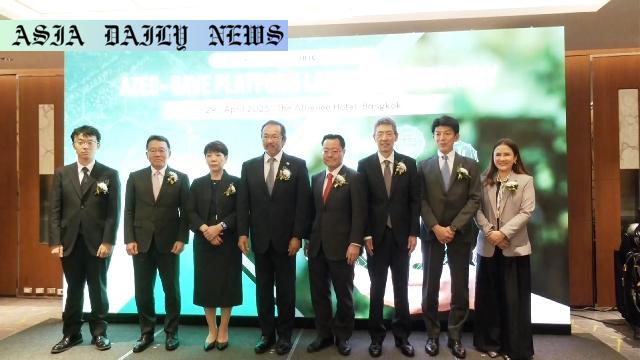Decarbonization program focuses on energy-saving factory technologies for a sustainable Thai industrial sector.
- Japan collaborates with Thailand for decarbonization in industrial sectors.
- Introduction of advanced energy-saving technologies in factories.
- Financial and technical support to Thai companies through conferences.

Introduction to Japan-Thailand Decarbonization Collaboration
Japan and Thailand have embarked on a significant partnership to drive decarbonization efforts in the Southeast Asian nation’s industrial sector. This collaboration, under the framework called the Asia Zero Emission Community (AZEC), is a strategic step towards achieving carbon neutrality while ensuring economic growth. By adopting energy-saving technologies in factories, Thailand aims to transform its industrial landscape, with Japan bringing its expertise and support to the forefront.
The Asia Zero Emission Community, established by Japan, is designed to create a network of countries committed to neutralizing carbon emissions in the region. As part of this program, Japanese and Thai government officials recently convened in Bangkok to formalize their commitment to this initiative. This collaboration aligns with Thailand’s dedication to achieving sustainable development and energy security, as highlighted by representatives from the Thai Energy Ministry during the ceremony.
Energy-Saving Technology as the Key to Decarbonization
A central focus of this initiative is the integration of advanced energy-saving technologies into Thailand’s industrial operations. Japanese companies are renowned for their innovation in energy efficiency, and Thailand is poised to benefit immensely from this expertise. Sakuma Kazuko from the Japan Bank for International Cooperation emphasized that Japan’s public institutions offer various programs to support such transitions, ensuring a smoother adaptation for industries.
Additionally, Japanese automakers already established in Thailand offer another advantage. With many production bases in the country, these companies are committed to incorporating energy-efficient practices, setting an example for other industries. Both governments are also set to organize conferences that will connect Thai businesses with Japanese technology providers, streamlining the adoption of these advanced systems.
Financial and Technical Support for Capital Investments
To facilitate the implementation of decarbonization technologies, financial support is a critical component of this program. Various funding options will be introduced, allowing Thai companies to invest in energy-saving technologies with reduced financial strain. This effort demonstrates a holistic approach that not only emphasizes technology adoption but also ensures its accessibility to businesses of all scales.
Moreover, this initiative highlights the role of international collaboration in combating global challenges such as carbon emissions. Through partnerships like these, countries can combine their strengths and resources, ultimately achieving shared goals more effectively and efficiently.
The Future of Sustainability: A Collaborative Effort
The overarching goal of this collaboration is not just to reduce carbon emissions but to establish frameworks for long-term sustainability in Southeast Asia. By promoting cleaner and more efficient energy usage within factories, this partnership underscores the importance of regional cooperation in addressing environmental challenges. Thailand’s industrial sector, bolstered by Japanese expertise and support, is set to become a model for sustainable practices in the region.
This program also emphasizes the mutual benefits of the Japan-Thailand partnership. While Thailand gains access to cutting-edge technologies and financial mechanisms, Japanese companies secure opportunities to expand their presence and influence in the region. Together, both nations demonstrate how collaborative strategies can drive meaningful progress toward environmental and economic goals.



Commentary
Fostering Regional Collaboration for Global Impact
The partnership between Japan and Thailand to drive industrial decarbonization is a remarkable step towards addressing one of the most pressing global challenges of our times. This initiative stands as an excellent example of how nations can unite their resources and strengths to achieve shared environmental goals. Japan, with its rich reservoir of technological innovations and expertise, is a perfect partner for Thailand, which is actively seeking sustainable solutions for its industries.
Technology as the Catalyst for Change
Energy-saving technology lies at the heart of this initiative, and rightly so. As industries around the globe grapple with the increasing demand for cleaner practices, innovation becomes the cornerstone of transformation. The emphasis on connecting Thai businesses with Japanese providers of energy-saving technologies exemplifies a strategic and forward-thinking approach. This not only streamlines adoption but also ensures that emerging solutions cater directly to the specific needs of Thai industries.
Building a Sustainable Future Together
What’s most inspiring about this partnership is the sense of mutual benefit and long-term impact. Beyond the immediate implementation of technologies, the collaboration lays down a framework for enduring sustainability and regional growth. In an era where environmental concerns are at the forefront of policymaking and business strategies, joint efforts like these serve as a blueprint for other nations and regions to follow.
As global citizens, we can only hope that this collaboration between Japan and Thailand inspires more countries to come together, transcending geographic and economic boundaries to combat climate change. These efforts remind us that the journey toward sustainability is not one that can be taken alone; it requires cooperation, innovation, and a shared vision of a cleaner and greener world.